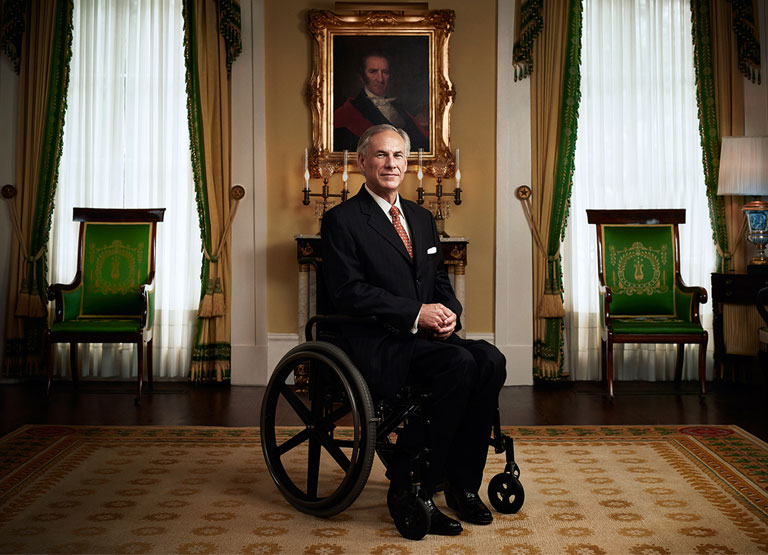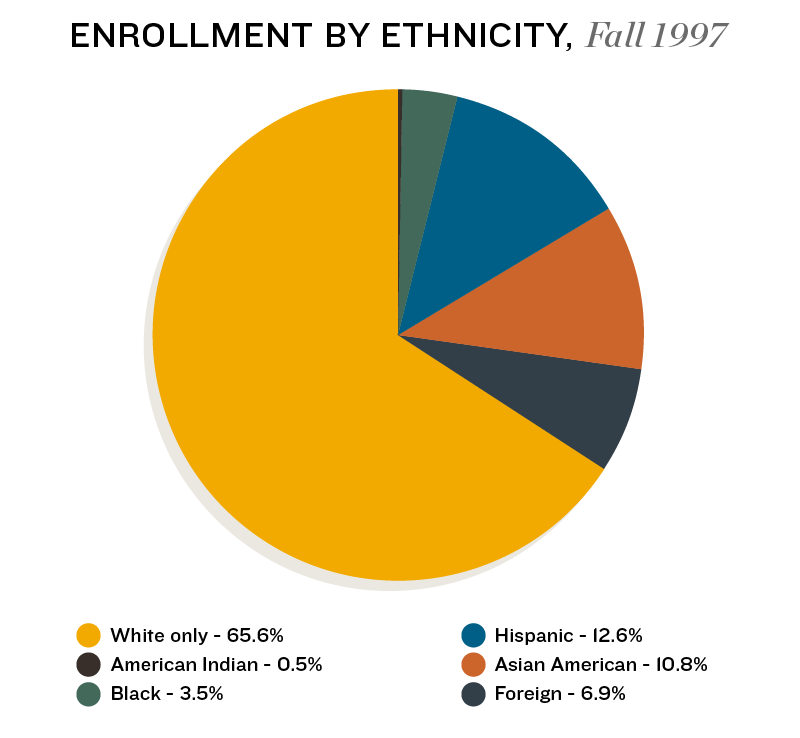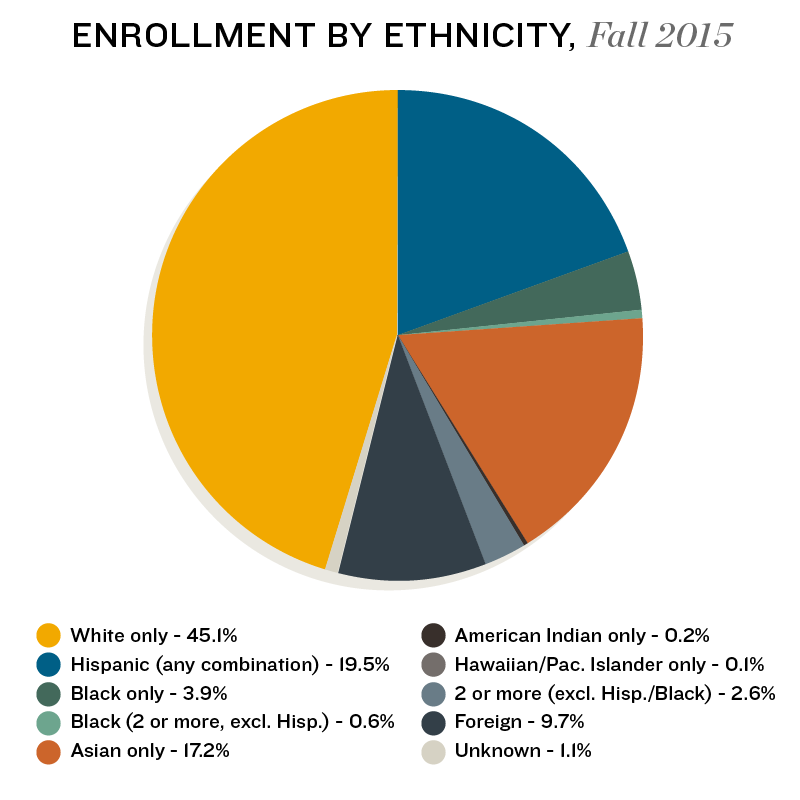Great Isn't
Good Enough
An interview with Texas Governor Greg Abbott

Interview by Tim Taliaferro | Photo by Randal Ford
When he took office as the 48th governor of Texas last year, Greg Abbott, BBA ’81, Life Member, became the first UT graduate to hold the state government's top job since Distinguished Alumnus Dolph Briscoe (1973-79). He has earned the praise of higher education leaders for creating a research fund that dedicates $40 million toward faculty recruitment. Abbott spoke with Alcalde editor-in-chief Tim Taliaferro at the Governor's Mansion about supporting research, his goals for Texas universities, and the UT vs. A&M rivalry game.
Tim Taliaferro:
It’s nice to see some touches of burnt orange in here.
Greg Abbott:
Some touches of burnt orange, yes. People claim this is the Baylor Room, because there is green and gold on the couches there. But this is the historic furniture that has been here in the mansion for almost a century.
TT:
Wow. I heard you recently say that when you became governor, you had two tasks to accomplish.
GA:
One was to fill our lakes, which I did. The other was for Texas to beat OU. So, first year in office, very successful.
TT:
Well done. And if you don’t mind, if we can ask for Item 2 again next year, that’d be great.
GA:
For as many years as I’m in office, we will continue to beat OU.
Abbott on Higher Ed and Texas
TT:
Great. Let me ask you about when you came into office, one of the first things you talked about as being a priority for you and for the state was higher education. Why was that a priority for you?
GA:
The future of the state of Texas will be governed in large part by the quality of higher education. We’ve seen the way in which, even though governmentally California is not nearly as effective as the state of Texas, California has been able to succeed because they’ve done a great job with their university system. It’s unbelievable. It’s not just Cal-Berkeley. Look at the University of California, Santa Barbara; the University of California, San Diego, schools that a lot of people haven’t heard of are ranked very high because they are research-centric universities doing a great job. And I see the way those universities can create the next generation of jobs. I want Texas to be the centerpiece of innovation, not just for the country but for the entire world. And we can foster that through our universities.
Abbott on the Nobel Prize
TT:
That’s an interesting concept that you’ve laid out with your Governor’s University Research Initiative, 1 that attracting talent, Nobel laureates and people like that can lead to an economic impact. What’s the connection there?
1
The Governor’s University Research Initiative, enacted in 2015, is a $40 million matching-grant program intended to help universities attract the best and brightest researchers in the world to Texas.
GA:
We’ve seen this tangibly at the University of Texas Southwestern Medical School in Dallas, where they have a large number of Nobel laureates, as well as dozens of National Academy of Science and Medicine award winners. We see the way that they are tangibly able to turn that into monetized results, as well as to bring in even better researchers and better students. We want to replicate that model at all of our universities, let’s say in the University of Texas System. But, really, at all of the universities in the state of Texas. And so, we set up this new research initiative where we as a state provide matching funding for all of our public universities who are able to attract a Nobel laureate or a National Academy member, who may go on to be the next Nobel laureate. We want Texas to be the home of the broadest sector of the best and brightest minds and researchers in the United States of America, and we are willing to put our money where our mouth is.
Abbott on researchers
TT:
And when you talk to administrators, to the universities, what feedback are they giving about what that program is going to do?
GA:
They’re very excited because, for one, they see a governor who is enthusiastic about what they are doing. They see the possibility, the vision, of where they can take their universities. But I've got to tell you something else that’s interesting, because I made this promise. I made this promise to Greg Fenves at the University of Texas as well as to the other presidents of universities across the state of Texas. I said, “If you find a great researcher at some other school across the country that you want to bring to Texas, count me in as helping you out, and I will personally call and talk to that person and convince them to come to the state of Texas.” And so, I’ve called researchers and professors across the country, and they are astounded to get a phone call from a governor asking them to bring their research project to the great state of Texas. It’s a very powerful effect.
Abbott on a university of the first class
TT:
At the University of Texas at Austin, we have this mantra, near scripture, about the line from the Texas Constitution, “Establish and provide for a university of the first class.” In practical terms, in modern terms, what does that phrase mean to you?
2
U.S. News and World Report ranked 42 graduate programs at the University of Texas at Austin as among the top 10 nationally in its 2016 rankings.
GA:
For me, it means something more than just “of the first class.” To me, Texas is and should be the best state. Texas should have the best public university. I want to see during my time as governor for Texas universities to be the very best in the United States. I'm very proud of recent rankings that I’ve seen about the University of Texas. I’ve seen various rankings like No. 7 among publics. I saw No. 1 with regard to petroleum engineering. No. 1 with regard to accounting. Top 10 status of something like 40 programs 2 at the University of Texas. Those are great numbers, but this is Texas, and great is not good enough. We expect to be the best. And I expect the University of Texas to go to work every single day with one goal in mind, and that is what do they need to do to become No. 1 in the nation?
TT:
If you had to give the university a grade right now on that vision, 42 graduate programs ranked in the Top 10 nationally, what does that equate to in your mind? Is it an A, is it a B?
GA:
I’ll give it an A. I mean, here is the deal, are they making progress along the lines of what they need to do? The answer is yes. Are they there yet? The answer is no. But we are just in the early stages. It’s like giving a grade for where you are in the first inning of a nine-inning baseball game. We are just now getting going. And are they developing the strategies to achieve the success they need to do? The answer is yes. They’re starting in a terrific position. Now they just need to continue this vision.
Abbott on UT regents
TT:
Another one of the early things that you did as governor was to appoint three regents. Two were new regents; one was a reappointment. At that time, the board had been tense. There’d been some strife. What were you looking for when you selected a regent, and what did you tell your appointees?
GA:
I wanted to make sure first that all of the appointees shared my vision with elevating the University of Texas to strive to be the No. 1 public university in the United States of America. I wanted them to instill the urgency of that vision in their fellow board members. I wanted them to all, basically, be rowing in the same direction to achieve that goal, and I think that they are achieving that.
3
The UT Board of Regents approved 3.1 percent increases in tuition for fall 2016 and fall 2017, the first tuition increases at UT-Austin since 2011.
TT:
Good. Let me ask you about tuition. This is a hot issue nationally. The UT Board of Regents recently approved a tuition increase. 3 It’s been met with some lukewarm reaction. You’ve recently stood up a multiple agency taskforce to look at affordability. What are you hoping to learn? Or what are you hoping that they can lay out for the state?
GA:
We have multiple goals in higher education. We want to see more students graduate from four-year programs, or it could be higher programs, you know, post-graduate degrees, so that we have a very highly educated state. One way that we do that is by making college more affordable and more accessible. And so we’re looking for cost, we’re looking for strategies to achieve efficiencies, and so we want to thoroughly study what’s going on at universities to find out what needs to be done to make college more affordable and more accessible to more students.
TT:
Is there a balance somewhere in there between two goals, a goal about access and a goal about excellence?
GA:
There is a balance, and our goal is to find that balance.
TT:
OK. Well said. Is there anything in particular when you think about UT-Austin that you’d like to see it do differently or do better?
GA:
Obviously, it’s starting in such a grand position. It is highly regarded across the entire nation. And all I want it to do is to continue to find ways of elevating itself. And it has to be broad-based. I talk to people around the country who are very impressed, and they bring up how great, let’s say, the McCombs School of Business is or how great our engineering program is or this school or that school, and we just need to continue that. As an example, one thing that I find very, very exciting is the addition of the medical school at the University of Texas at Austin. That is one way in which the school is just going to continue to climb that ladder among rankings in the universities across the country. And so, we continue to see the progress by the school. I just want to see that progress continue, but I want the school and the leaders to feel the sense of urgency that I have.
Abbott on the Dell Medical School
TT:
The Dell Medical School opens this summer. It’s taking its first class of 50 students. What do you think the school can do for the state?
GA:
It’s going to be huge, because the vision is much grander than that. The vision, of course, is to have a medical school where we train doctors and people in the medical profession that we need, but also, I want the state of Texas, and in particular a triangle area of which Austin is somewhat of a centerpiece, to be the leading region in the world for life-sciences innovation. And we intend to create a large research corridor adjacent to the Dell Medical School that will lead to the next generation of scientific and medical advancements.
Abbott on campus carry
4
Senate Bill 11, or campus carry, authorizes people with concealed handgun licenses to carry inside most campus buildings. At UT-Austin, guns will be allowed in classrooms but not in dormitories. The law goes into effect Aug. 1.
Editor’s Note: We could find no instances of a student with a concealed handgun license assaulting a professor with a gun. It is the case, however, that at the University of Oregon and University of Wisconsin guns are not allowed inside campus buildings. In Texas, they will be under SB 11. Regarding the phrase, “no instances whatsoever,” there have been instances of accidental discharge in Colorado, Utah, Mississippi, and Idaho after campus carry laws went into effect. An Abbott spokesman stressed that the governor was referring only to instances of a student with a CHL assaulting a professor.
TT:
Let me ask you briefly about campus carry. SB 11, 4 which goes into effect in August, has been met with some sensitive reaction. I think it’s fair to say that faculty are not wild about it. And as someone who’s as focused as you are in bringing that community up, what is typically your message to them, how do you help them understand why it’s important or allay their concerns?
GA:
I want them to look at the facts and look at reality. There’s a concern that’s been raised by professors that if you have campus carry, a student could bring a gun into a classroom and assault a professor because of something a professor does. Here’s the fact that they’re missing: That concern exists right now. Anybody can bring a gun into any place and assault any person anytime, anywhere. What campus carry does is it only authorizes those who go to the special training and background. And if you look at the schools across the country—University of Wisconsin, University of Oregon, University of Colorado—in states where this is already allowed, they haven’t had any instances whatsoever. Now, if I could be pointed about this, it’s kind of ironic. We know that—I think it was the dean of the Architecture School…
TT:
Right. Fritz Steiner.
GA:
…left the University of Texas because of this. And he went to Philadelphia. He hasn’t done any math because if you do the math, the reality is the probability of him being the victim of a gun crime just went up because he went to Philadelphia, which is far more dangerous than Austin, Texas. So, all I ask is look at the probabilities, do the math, and when you study the situation, you will see there is no reason to be concerned whatsoever.
Abbott on admissions
5
Fisher v. University of Texas concerns whether the university may consider race as a factor in admissions. The plaintiff, Abigail Fisher, alleges that she was denied admission to UT on account of her race. The U.S. Supreme Court has twice heard oral arguments on the case, and a decision is pending.
TT:
The Supreme Court has heard the Fisher 5 case twice now, and I’m curious what your opinion or your observations are about this as a former Attorney General. Do you think the university has the right strategy here, the right position about considering race in admissions, or do you think maybe it’s time to look for a different way to handle this?
GA:
The university has been focused on ensuring that they have a diverse student body, and they have I think achieved that, and they will continue to achieve it regardless of how the Supreme Court rules. One thing that I would like to see the University of Texas have greater latitude in is the percentage requirement of students that are admitted into the university so that they do have the ability to have the absolute best and brightest at the University of Texas at Austin. And they would—I know the attitude and approach of the University of Texas, and that is they will do that while at the same time ensuring the diversity that is the trademark of the University of Texas at Austin.
TT:
You’re saying the cap or maybe lowering the percentage of the class that gets automatically admitted (through the Top 10 Percent Law).
GA:
Exactly. The University of Texas needs to have greater latitude. Even when they do that, you’ll see, if you look back to the university that they had before the automatic admissions compared to what they have now, it’s my understanding it was fairly much the same. 6 And so we do have the ability to ensure that we’ll be providing high-quality education to students of every single background across the state of Texas while at the same time being able to elevate the University of Texas at Austin to the very top.
Abbott on alumni
TT:
I wanted to invite you, if you wanted, to speak to the University of Texas at Austin alumni community. If you had a message for them, what would you want them to know?
GA:
This is a team effort. As the University of Texas alumni watch a football game, if they think there’s one player who’s going to win that game, they’re wrong. You have to have offensive linemen, defensive linemen, defensive backs, offensive backs, coaches all working together. That’s what allowed Texas to beat OU last year. It was a team effort. The same thing applies with regard to elevating the school as a whole. If you’re sitting back in Houston or South Texas or North Texas and think, well, it’s just going to be those people in Austin who elevate the school, you’re wrong. This is a team effort. That includes the alumni. And everyone has to get involved. Everyone has to get on the same page of urging all of their elected officials to support this cause. And the way they do it is not to necessarily focus on the University of Texas itself but to explain how elevating the University of Texas is a way of elevating the entire state of Texas.
Abbott on UT vs. A&M
TT:
You mentioned the football team. What’s your opinion about UT and A&M? Should the rivalry game come back?
GA:
Yes.
TT:
Governor Abbott, thank you so much.
GA:
My pleasure.
Editor’s Note: The interview has been edited for length and clarity. Watch the whole interview here.



